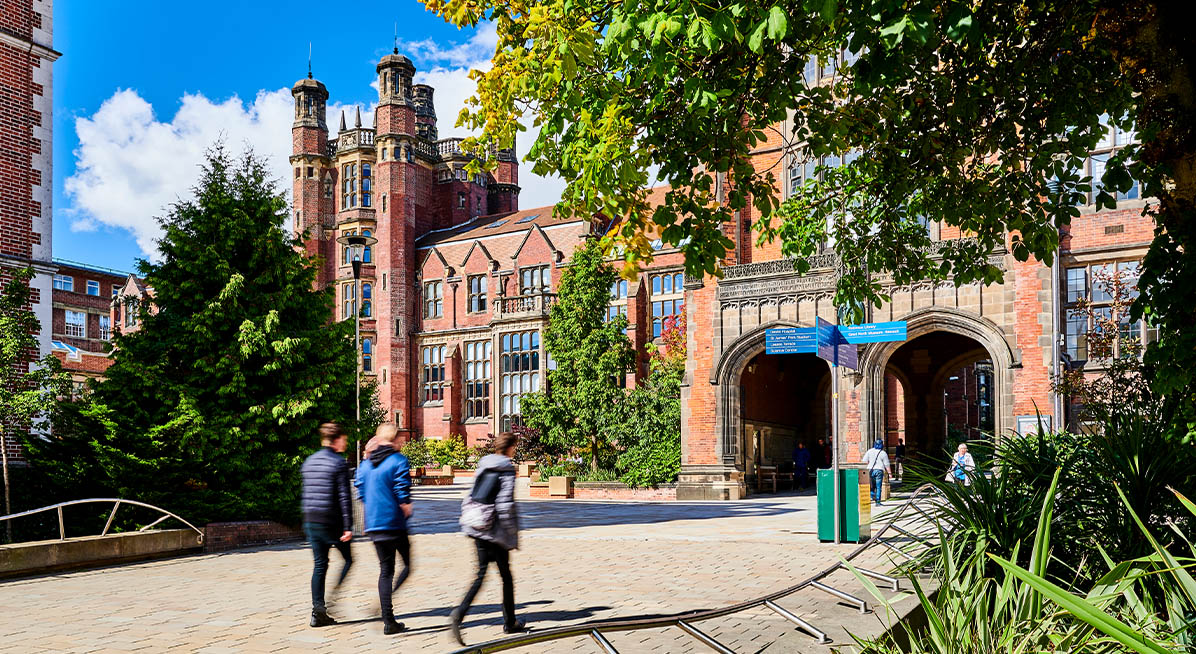Geography BA Honours
- UCAS code: L701
- Full time
- 3 years
Equip yourself with the specialist skills needed to address pressing global challenges. Our flexible geography degree is accredited by the Royal Geographical Society.
You are currently viewing course information for entry year: 2026
Next start date:
- September 2026
UCAS Institution name and code:
- NEWC / N21
Course overview
Our BA Geography degree explores key societal, economic and environmental challenges. It encourages you to engage with, explore and understand the world.
Our teaching is informed by the research of our world-leading academics and spans the breadth of the discipline.
You can tailor your degree to your interests and won't need to decide between human and physical geography to apply.
This enables you to become a specialist in your chosen field or to continue to study a broad range of geographical subjects (both human and physical).
You can select from a large number of Geography modules. These range from Glacial Environments, and Global Environmental Change, to Geopolitics, and Local and Regional Development.
Your course and study experience - disclaimers and terms and conditions
Please rest assured we make all reasonable efforts to provide you with the programmes, services and facilities described. However, it may be necessary to make changes due to significant disruption, for example in response to Covid-19.
View our Academic experience page, which gives information about your Newcastle University study experience for the academic year 2025-26.
See our terms and conditions and student complaints information, which gives details of circumstances that may lead to changes to programmes, modules or University services.
Quality and ranking
Professional accreditation and recognition
All professional accreditations are reviewed regularly by their professional body.
Modules and learning
Modules
The information below is intended to provide an example of what you will study.
Most degrees are divided into stages. Each stage lasts for one academic year, and you'll complete modules totalling 120 credits by the end of each stage.
Our teaching is informed by research. Course content may change periodically to reflect developments in the discipline, the requirements of external bodies and partners, and student feedback.
Featured module
GEO 3102: GeopoliticsExplore some of the biggest geopolitical challenges facing humanity today. Ranging from climate change to cyberconflict.

Optional module availability
Student demand for optional modules may affect availability.
Full details of the modules on offer will be published through the Programme Regulations and Specifications ahead of each academic year. This usually happens in May.
To find out more please see our terms and conditions
During Stage 1 we will help you to build knowledge, understanding and skills required to succeed in Stages 2 and 3 of your degree. You'll be introduced to key geographical research and the global challenges of the 21st century.
Modules
| Compulsory Modules | Credits |
|---|---|
| Becoming a Geographer | 20 |
| Interconnected World | 20 |
| Introduction to Physical Geography | 20 |
| Mapping a changing world: GIS for Geographers | 20 |
| Optional Modules | Credits |
|---|---|
| Physical Geography Field course: Landforms, processes and field techniques | 20 |
| Environment and Society | 20 |
| Coasts and Communities: Human Geography Fieldwork | 20 |
In Stage 2 you have the opportunity to tailor your degree to your interests. You'll study modules in advanced research techniques and key methods. Your remaining topics will be optional, giving you the chance to engage with the topics that interest you the most.
You will also have a choice of destinations for your Stage 2 residential field course.
Modules
Compulsory modules
If you're following a primarily Human Geography pathway you take the following compulsory modules (shown in the optional list below):
Key Methods for Human Geographers (20 credits)
Research Design and Planning for Human Geographers (20 credits)
If you're following a primarily Physical Geography pathway you take the following compulsory modules (shown in the optional list below):
Research Design and Planning for Physical Geographers (20 credits)
Key Methods for Physical Geographers (20 credits)
Modules
In Stage 3 you'll have a wide choice of optional modules that are directly linked to the research work of our staff.
You'll also undertake your dissertation research project. This is a major piece of independent research, based on your interests, led by you with support from a dedicated academic mentor.
Modules
| Compulsory Modules | Credits |
|---|---|
| Dissertation | 40 |
We base these figures and graphs on the most up-to-date information available to us. They are based on the modules chosen by our students in 2024-25.
Teaching time is made up of:
- scheduled learning and teaching activities. These are timetabled activities with a member of staff present.
- structured guided learning. These are activities developed by staff to support engagement with module learning. Students or groups of students undertake these activities without direct staff participation or supervision
Teaching and assessment
Teaching methods
Our geography courses involve a high level of staff-student interaction, including:
- tutorials
- lectures
- laboratory work
- IT lab sessions
- seminars
- fieldwork
Your modules also require a considerable amount of independent study.
Assessment methods
You'll be assessed through a combination of:
-
Coursework
-
Dissertation or research project
-
Essays
-
Examinations – practical or online
-
Group work
-
Presentations
-
Projects
-
Reflective report/journal
-
Reports
-
Seminar tasks/exercises
Skills and experience
Field trips
Fieldwork is an invaluable part of this degree. Day trips in and around our region bring to life topics like industrial change and the conservation of rivers, wetlands and coastal areas under climate change.
You'll get to explore further afield in Stage 2 on our residential field trips. The destinations we visit change from year-to-year. Recent Human Geography trips have been to Barcelona, Berlin, Copenhagen and Bosnia.
Between Stages 2 and 3 you will have the option to complete fieldwork in physical or human geography as a part of your Dissertation. You will have the opportunity to apply for Expedition funding to enable you to conduct ambitious dissertation research anywhere in the world.
Find out more about geography fieldwork at Newcastle
Research skills
You'll be part of a vibrant research community. Fieldwork through your degree will help you grow as a researcher and cultivate your own research techniques.
Your final year dissertation enables you to refine the research skills you've developed throughout your degree.
Opportunities
Work placement
Apply your practical skills, increase your confidence and gain real-life work experience to accelerate your career. Take a 9-12-month industrial placement in the UK or abroad. Work placements usually take place in stage 3 of your studies and extend your degree by one year.
Find out more about work placements.
Study abroad
Experience life in another country by choosing to study abroad as part of your degree. You’ll be encouraged to embrace fun and challenging experiences, make connections with new communities and graduate as a globally aware professional, ready for your future.
You may choose to spend a whole year between Stages 2 and 3 or semester 1 of Stage 3 on an international exchange at a partner institution.
Facilities and environment
Facilities
As a geography student at Newcastle, you'll be based in the School of Geography, Politics and Sociology.
You'll have access to modern laboratories and workshops, and a range of facilities and specialist equipment that are part of the entirely refurbished and newly resourced home of Geography at Newcastle, the Henry Daysh Building and Geoscience Laboratories.
Field equipment
Field equipment includes a range of technologies for:
- topographic survey
- soil and sediment sampling
- biological and chemical analysis
- hydrological analysis
Our laboratories
- biology laboratory
- chemistry laboratory
- geomorphology and sediment laboratories

Support
You'll have the support of an academic member of staff as a personal tutor throughout your degree to help with academic and personal issues.
Peer mentors will help you in your first year. They are fellow students who can help you settle in and answer any questions you have, when starting university.
You'll also benefit from our:
- extended induction programme, to help you quickly settle in to our lively community of staff and students
- activities and events run by our highly active student-run society, GeogSoc
Your future
Join a network of successful graduates
Recent graduates have secured roles such as:
- graduate planner
- graduate surveyor
- account executive
Read what our graduates have to say about studying Geography at Newcastle University
Graduates in demand
Our graduates’ excellent employment record is a sign of the flexibility and professionalism that our geography degrees develop.
You will leave with sought-after skills - including teamwork, project management, research and presentation skills - making you employable in a wide variety of fields.
Our graduates have been recruited by a variety of organisations, including:
- the Department for Business, Innovation and Skills
- the Environment Agency
- independent and major scientific consultancies
- Raleigh International
- the Armed Forces
- the NHS
- local government
- financial services firms
Make a difference
Follow in their footsteps

- Name: Lauren
- Nationality: British
- Graduated: 2014
- Now working as: Stakeholder Advisor for the Humber region for Orsted
"Studying Geography at Newcastle allowed me to find my passion. With inspiring lectures and invaluable support from lecturers through my dissertation process I wouldn’t be where I am today."
Find out what Lauren liked the most about studying Geography at Newcastle University and how this degree helped her in her career.
Careers support
We value your employability highly and have our own Geography Employability Co-ordinator. In your final year you can select an optional work experience module.
Our teaching draws on insights from a range of employers, including governmental bodies, non-governmental organisations, the private sector and charities.
Our Careers Service is one of the largest and best in the country, and we have strong links with employers. We provide an extensive range of opportunities to all students through our ncl+ initiative.
Visit our Careers Service website
Recognition of professional qualifications outside of the UK
If you’re studying an accredited degree and thinking about working in Europe after you graduate, the best place to find current information is the UK Government’s guidance on recognition of UK professional qualifications in EU member states. This official resource explains whether your profession is regulated in another country, what steps you need to take, and which organisation you should contact.
Entry requirements
All candidates are considered on an individual basis and we accept a broad range of qualifications.
The entrance requirements and offers below apply to 2026 entry.
| A-Level | |
|---|---|
| International Baccalaureate | |
|---|---|
Other UK and the Republic of Ireland qualifications
Alternative offers at Newcastle
Through one of our contextual or alternative offer routes, you could receive an offer of up to three grades lower than the typical requirements.
Contextual offers
We use certain contextual data from your UCAS form, alongside your application, to consider challenges that you may have faced in your education and the potential effect this may have had on your qualifications. This means you may be eligible to receive a lower contextual offer.
PARTNERS offers
One of the largest and longest support entry routes to university of its kind for students from underrepresented backgrounds. We support applicants from application through to study.
Realising Opportunities offers
A unique programme delivered in collaboration with 10 leading, research-intensive universities in the UK. The programme is open to students in Year 12/first year of college.
Pathways to Newcastle offers
Pathways to Newcastle, our national skills entry route, is available for specific subject areas.
High Performance Athletes
We support promising athletes at the application stage, who compete in regional, national or international levels in their sport.
Qualifications from outside the UK
English Language requirements
Entrance courses (INTO)
International Pathway courses are specialist programmes designed for international students who want to study in the UK. We provide a range of study options for international students in partnership with INTO.
These courses are specifically designed for international students who want to study in the UK and progress onto one of our undergraduate degrees. Our International Study Centre, has a range of study options including:
- International Foundation
- International Year One
- English Language courses
Find out more about International Pathway courses
Admissions policy
This policy applies to all undergraduate and postgraduate admissions at Newcastle University. It is intended to provide information about our admissions policies and procedures to applicants and potential applicants, to their advisors and family members, and to staff of the University.
University Admissions Policy and related policies and procedures
Credit transfer and Recognition of Prior Learning
Recognition of Prior Learning (RPL) can allow you to convert existing relevant university-level knowledge, skills and experience into credits towards a qualification. Find out more about the RPL policy which may apply to this course.
Tuition fees and scholarships
Tuition fees for academic year 2026-2027
The 2026 entry home fees have not yet been confirmed.
| Qualification: BA Honours | |
|---|---|
|
Home students full time 3 years |
Tuition fees (Year 1)
Not set |
|
International students full time 3 years |
Tuition fees (Year 1)
25,800 |
Year abroad and additional costs
For programmes where you can spend a year on a work placement or studying abroad, you will receive a significant fee reduction for that year.
Some of our degrees involve additional costs which are not covered by your tuition fees.
Scholarships
Find out more about:
Open days and events
You'll have a number of opportunities to meet us throughout the year at our on-campus and virtual open days.
You'll be able to:
- explore our beautiful campus
- find out about our vibrant city
- discover what students think about studying at Newcastle
You'll also have the opportunity to speak to academic staff and find out more about the subjects you're interested in.
Find out about how you can visit Newcastle in person and virtually.
We regularly travel overseas to meet with students interested in studying at Newcastle University. Visit our events calendar to find out when we're visiting your region.
How to apply
Apply through UCAS
To apply for undergraduate study at Newcastle University, you must use the online application system managed by the Universities and Colleges Admissions Service (UCAS). All UK schools and colleges, and a small number of EU and international establishments, are registered with UCAS. You will need:
- the UCAS name and institution codes for Newcastle University (NEWC/N21)
- the UCAS code for the course you want to apply for
- the UCAS 'buzzword' for your school or college
If you are applying independently, or are applying from a school or college which is not registered to manage applications, you will still use the Apply system. You will not need a buzzword.
Apply through UCASApply through an agent
International students often apply to us through an agent. Have a look at our recommended agents and get in touch with them.
Get in touch
By phone
Call us on +44 (0) 191 208 3333 and press option 1. Our opening hours are Monday to Friday 10am until 4pm.
Live chat
Our NCL chatbot might be able to give you an answer straight away. If not, it’ll direct you to someone who can help.
You'll find our NCL chatbot in the bottom right of this page.
Online
Chat to our students
Choosing a university is a big decision. If you've got questions about a particular course, student life or the city of Newcastle, why not chat to our friendly students or graduates!
Keep updated
We regularly send email updates and extra information about the University.
Receive regular updates by email







